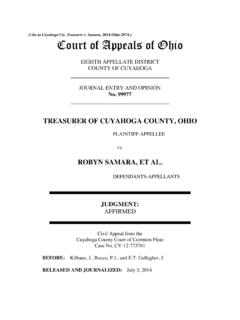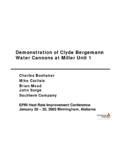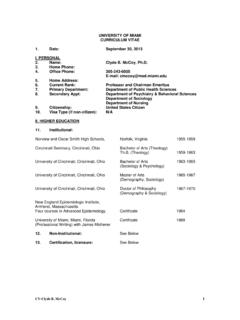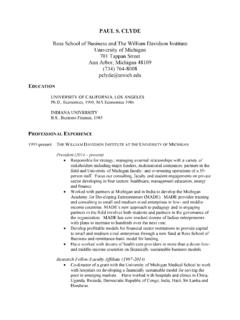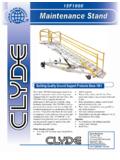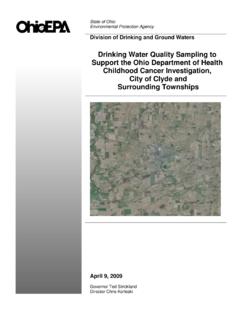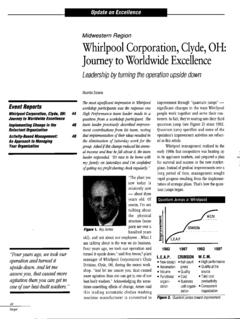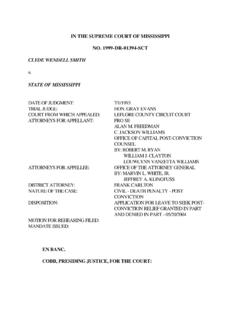Transcription of State ex rel. Toledo Edison Co. v. Clyde - Ohio
1 The State ex rel. Toledo Edison Company, Appellant, v. City of Clyde et al., Appellees. [Cite as State ex rel. Toledo Edison Co. v. Clyde (1996), __ Ohio __.] Municipal corporations -- Public utilities -- Section 3 of Clyde Ordinance 1995-01 violates the Miller Act with respect to termination of Toledo Edison Company s service to existing facilities inside Clyde -- Section 3 of Clyde Ordinance 1995-01 not subject to Miller Act regarding new facilities. (No. 95-1358 -- Submitted April 15, 1996 -- Decided August 28, 1996.) Appeal from the Court of Appeals for Sandusky County, Nos. S-88-046 and S-95-002. In July 1965, the Toledo Edison Company ( Toledo ) acquired, by warranty deed, the electric generating, transmission, and distribution system then owned and operated by the village (now city) of Clyde , and received a twenty-five-year nonexclusive franchise to provide electricity to Clyde s inhabitants.
2 In 1987, Clyde exercised its rights under Section 4, Article XVIII of the Ohio Constitution and re-established a municipal electric system. The next year, two years before the franchise agreement expired, Clyde s city council authorized Clyde to build a duplicate electric distribution system to provide electric service to its 2inhabitants. Later that same year, Toledo asked Clyde to renew the nonexclusive franchise agreement for an additional twenty-five years. Clyde declined. Toledo then initiated a mandamus proceeding, case No. S-88-046, against Clyde , its mayor, its city manager, and its city council members, claiming that construction of a duplicate system and failure to renew the franchise forced Toledo to abandon or withdraw from its existing electric distribution facilities and system in Clyde .
3 Toledo argued that Clyde must obtain approval from the Public Utilities Commission of Ohio before requiring Toledo to abandon its existing electrical distribution facilities or withdraw from its electric service inside Clyde . Toledo requested an order directing Clyde to file an application with the commission seeking approval to require Toledo to abandon its facilities and withdraw its electric service from Clyde . Subsequently, the court of appeals adopted in its judgment entry the parties settlement agreement in case No. S-88-046, as follows: Toledo Edison and the City of Clyde hereby agree that, in the event that the City of Clyde determines to undertake any action requiring the cessation of electric service in Clyde by Toledo Edison , or requiring the withdrawal or abandonment of Toledo Edison s facilities within the City of Clyde , the City of Clyde shall comply 3with Ohio Revised Code Section Notwithstanding the expiration of the franchise described in paragraph 1 above, the City of Clyde shall not require Toledo 4 Edison to abandon or withdraw its facilities within the City of Clyde , or the electric service rendered thereby.
4 Unless and until the City of Clyde obtains an order from the Public Utilities Commission of Ohio, approving such abandonment or withdrawal. The settlement agreement also stated that it did not grant a franchise to Toledo . Neither party appealed the order adopting the settlement agreement. On January 3, 1995, Clyde s city council gave the first reading of Ordinance 1995-01. As passed on January 17, 1995, the ordinance reads as follows: SECTION 2. There is presently no provider of electric, water or sewer utility services, other than the City of Clyde and its utility departments, that is authorized by the City of Clyde under Article XVIII of the Constitution of the State of Ohio, to provide such utility services within the corporate limits of the City of Clyde .
5 SECTION 3. On and after the effective date of the ordinance, all utility service arrangements for electric, water or sewer utility service within the corporate limits of the City of Clyde , as the same may be altered from time to time through annexation or otherwise, shall be made with the City of Clyde s electric, water or sewer utilities. 5 SECTION 4. This ordinance shall not affect utility services or products currently provided at transmission voltages of approximately 69,000 volts or more. Nor shall this ordinance affect utility service arrangements between individual residents of the City of Clyde and providers of utility services other than the City of Clyde , if such arrangements are existing and in place as of the effective date of this Ordinance.
6 Such arrangements are hereby permitted to continue, at the option of the residents having such arrangements, until such time as the City of Clyde obtains such authorization or approval as may be required under the laws of the State of Ohio to cause such existing arrangements to be terminated and utility service provided by the City of Clyde to be substituted for the service provided under such other arrangements. (Emphasis added.) That same day, Resolution No. 1995-04 was passed, instructing the city solicitor to initiate abandonment proceedings before the commission seeking to replace electric service inside Clyde s city limits with service by Clyde and also seeking removal of Toledo s distribution system from inside Clyde s city limits.
7 An application in accordance with the resolution was filed the next day with the commission, case No. The application did not seek commission approval of Section 3 of Ordinance 1995-01. 6 Two weeks later, Toledo filed a new mandamus action against Clyde , case No. S-95-002, and a separate motion for contempt against Clyde in case No. S-88-046, alleging that Section 3 of Ordinance 1995-01 violated and the judgment entry in case No. S-88-046 because Section 3 closed some or all of Toledo s lines for service. Toledo requested a writ of mandamus ordering Clyde to obey by filing an application with the commission for permission to require Toledo to abandon its lines within Clyde and prohibiting the second reading, enactment, or enforcement of Ordinance 1995-01 to the extent that it violated the writ of mandamus.
8 Clyde moved to dismiss Toledo s new mandamus complaint. The parties then stipulated that the case involved only one substantive legal issue: Whether the Clyde Respondents violated this Court s Journal Entry of April 24, 1989 or the Miller Act by not requesting in Clyde s Miller Act application at the Public Utilities Commission authorization for the requirement imposed by Section 3 of the City of Clyde Ordinance No. 1995-01 that all future utility service arrangements be made with the City of Clyde . 7 Clyde then filed its answer to the mandamus complaint, asserting that the complaint failed to State a claim upon which relief could be granted, that the court lacked jurisdiction to grant the injunctive relief requested, that Toledo had a plain and adequate remedy at law, and that Toledo lacked standing as a relator under The court of appeals stated that Section 3 of Clyde Ordinance 1995-01 did not apply to anyone currently receiving service from Toledo and that Clyde was otherwise in compliance with the April 24, 1989 judgment entry and The court then held, without explanation.
9 That Section 3 of Clyde Ordinance 1995-01 did not violate , and that Clyde need not seek or obtain commission approval before enforcing that section of its ordinance. The court of appeals then found Toledo s complaint not well taken. The cause is now before this court upon an appeal as of right. _____ Richard W. McLaren, Jr., for appellant. Duncan & Allen, Gregg D. Ottinger and John P. Coyle; Homan & Pearce and William D. Pearce, for appellee. 8 Chester, Willcox & Saxbe, John W. Bentine and Jeffrey L. Small, urging affirmance for amicus curiae, American Municipal Power-Ohio, Inc. _____ Per Curiam. In order to obtain a writ of mandamus, the relator must show that the relator has a clear legal right to the relief prayed for, that the respondent is under a legal duty to perform the requested act, and that relator has no plain and adequate remedy at law.
10 State ex rel. Fostoria Daily Review Co. v. Fostoria Hosp. Assn. (1988), 40 Ohio 10, 11, 531 313, 314. For the reasons that follow, we reverse the decision of the court of appeals and find that Section 3 of Clyde Ordinance 1995-01 violates the Miller Act with respect to the termination of Toledo s service to existing facilities inside Clyde , but affirm the decision of the court of appeals that Section 3 of Clyde Ordinance 1995-01 is not subject to the Miller Act regarding new facilities. Under Section 4, Article XVIII of the Ohio Constitution, [a]ny municipality may acquire, construct, own, lease and operate within or without its corporate limits, any public utility the product or service of which is or is to be supplied to the municipality or its inhabitants, and may contract with others for any such product[s] or service.

